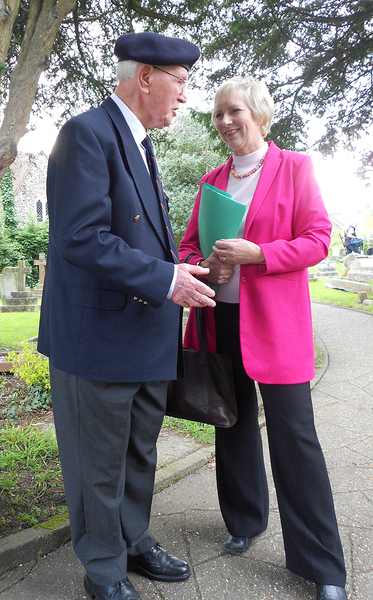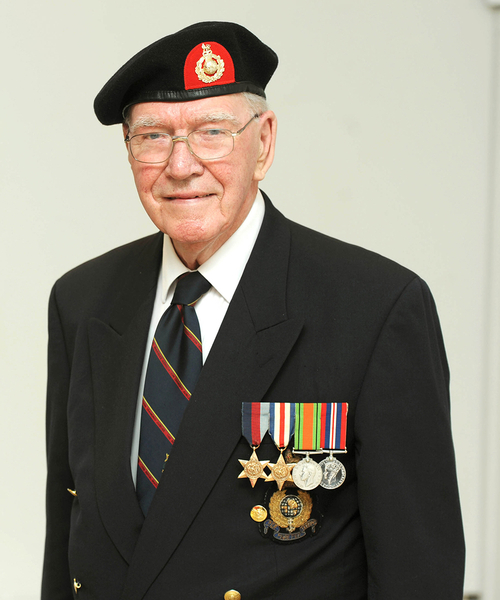D-Day veteran tells story on TV
SEVENTY years ago, Ted Turner helped to storm the Normandy beaches on D-Day.

Ted Turner with Pam Rhodes at St John's Church, Purbrook

Ted Turner

As an 18-year-old Royal Marine, he helped Canadian troops secure a beachhead on Juno beach in the decisive invasion of France in June 1944. He’d sailed across the English Channel in a tiny landing craft with the Allied invasion fleet, before approaching beaches bristling with German troops.
Ted, who lives in Waterlooville and is a regular worshipper at St John’s Church, Purbrook, told his story on a special Songs of Praise programme broadcast on June 1.
He was interviewed in St John’s Church by presenter Pam Rhodes, and was also asked to read a prayer for the programme. Click here to watch it.
And on June 6 – 70 years to the day since the D-Day invasion – Ted will be in Normandy for events to mark the anniversary.
“The older I get, the more emotional I get about it,” said Ted, now 88. “I started to well up when Pam Rhodes asked me about it. It’s remembering friends who never came back.”
Ted was born and brought up in Hilsea, Portsmouth, and attended St Francis Church. He left school aged 14, and started working for the Co-op Dairy, helping with the milk rounds. At 17 he decided to go to Portsmouth’s recruiting office and sign up for the RAF, but he was too young. Instead he was taken on by the Royal Marines in January 1943.
He was stationed at Eastney Barracks and then at Fort Gomer in Gosport. His training included time in North Wales, Great Yarmouth and in Dartmouth where he spent six weeks learning how to use a landing craft and basic seamanship.
He and three other colleagues then manned a landing craft which was based at Itchenor, near Chichester. On June 4, 1944, they sailed across to Lee-on-Solent and came alongside a Canadian troop ship. And on June 5, they sailed across the Channel in their landing craft as part of the invasion.
Seven miles off the French coast, the Canadian engineers and their trailer came on board their landing craft, and Ted and his colleagues inched towards Juno Beach near Courseulles-sur-Mer.
“It was very quiet, no one spoke,” said Ted. “Then when we got close to the beach, the Germans started firing and it was pretty noisy. I was used to it, as my dad had been in charge of the Firewatch in Portsmouth, so I’d heard air raids and gunfire anyway.
“I wasn’t frightened. I was only young, so it felt a bit like an adventure to me, even at that stage. We landed the troops on the beach and then backed off, so we could see what was going on. Some landing craft were hit and started sinking, some Canadians were being shot around us.
“We slept on the beach that night, and I remember a German plane coming over and flying very low. We were all firing at it. The next day, we started unloading all the ships by landing craft. Most of the boxes we unloaded seemed to be food.
“The next day, the Canadians dug a trench for the dead bodies and covered them over. But we saw a few bodies still floating on the tide, even a week after D-Day. I also remember I hadn’t eaten or washed or shaved for two days and I came across a beach party having breakfast and scrounged some from them.”
Ted stayed in Normandy for six weeks before he was picked up by a ship and returned to the UK. Some of his colleagues decided to sail landing craft back across the Channel, but hit rough seas and bad weather. Thirty of them were drowned. Ted is now hoping to get a plaque erected at their former camp in Bracklesham Bay to remember their loss.
He also served in Germany, Sri Lanka, Hong Kong and Japan after the end of the war. He remembers sailing past Hiroshima after the atomic bomb had been dropped and seeing the devastation it had wrought.
Ted came home and returned to work at the dairy in Purbrook. He married Enid, and then turned his hand to spray-painting cars. He had hurt his back doing so much heavy lifting in the dairy, so became an apprentice in a garage at the age of 28. He ultimately spent 35 years working in Wadhams Motors in Southsea.
Meanwhile, Enid spent 50 years as Brown Owl for the Brownies in Purbrook. The couple never had children, but acted as parents to several generations of Brownies.
“Enid never drove, so I was always chauffeur to take her to Brownies every Tuesday, and also to take them to pack holidays,” said Ted. “We got to know those families well, and there are still some former Brownies in the St John’s congregation who are in their 50s, 60s and 70s. That’s helped to make it feel like a real family.
“I do pray a lot of the time, as you can’t live without it. And God has helped me in lots of situations, especially when Enid died four years ago.”
When Ted travels to Normandy for the 70th anniversary of D-Day, he’ll be presented with an insignia by a local headteacher on behalf of the French. He also hopes to visit Ranvilles Cemetery on June 5 with Prince Charles, and to be there for the commemorative service with the Canadians at Courseulles.